By Joel Meyers
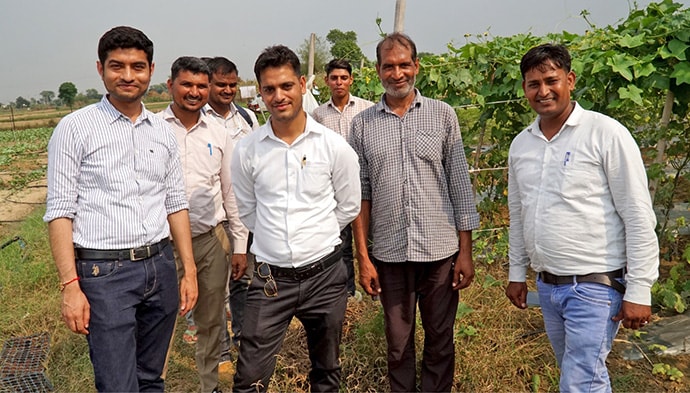
Shashank Devra (left) with his implementation colleagues and farmer (second from right) in Nuh, India for the agriculture intervention demonstration. Photo: Joel Meyers
I was blanketed by the humid, 92° F day as I stepped out of the air-conditioned white SUV onto the rutted and sun-dried path. Shashank Devra, program lead for the Implementation Team at S M Sehgal Foundation (Sehgal Foundation), guided me toward his colleagues, who arrived in another SUV and a couple on motorbikes, and the local farmer we were scheduled to meet with for my visit.
We were in the rural sub-district of Nuh in the state of Haryana, India, about an hour and a half drive south from Sehgal Foundation headquarters in Gurugram (Gurgaon). Gurugram is a planned city, 30 kilometers SW of Delhi, a modern complex of glass, chrome, and brushed metals that houses some of the most influential tech companies in India, including offices for the likes of Google and WeWork. However, Nuh was mile after mile of smallholder farms, small brick-and-mud storage huts, massive piles of organic debris, and a peppering of small trees with the occasional shrub, all accessed by paved and rutted dirt roads.
According to Shashank, the Sehgal Foundation team chose Nuh for this particular farming project because it is the most “underdeveloped district in the State of Haryana” based on government criteria of income, health, and other factors. The region is considered an “aspirational district,” which the Sehgal Foundation team considered an ideal place to implement the agricultural interventions and economic empowerment programs they had arranged for me to see, based on my question, “Are there projects local to Delhi that will demonstrate how Sehgal Foundation is addressing the challenge of food insecurity?”
I only had one day, and I am glad they brought me here.
Rooted in social impact for 24 years
S M Sehgal Foundation was founded in 1999 by visionary entrepreneurs and philanthropists, Dr. Suri Sehgal and his wife Edda Sehgal. The foundation promotes sustainable rural development that respects human dignity, protects the environment, and promotes social justice by working with rural communities in India to help them achieve self-reliance and build their capacities.
Sehgal Foundation has 300 employees and partners with hundreds of corporate, government, and academic institutions and individuals. Their work has impacted over four million people in 12 states, in more than 2,000 villages. They have expanded their reach by 40% in the last five years and have the goal to keep expanding.
I spoke with Anjali Makhija, Trustee and CEO of Sehgal Foundation, earlier that morning at their energy-efficient headquarters in Gurugram. Anjali has been working in rural development for the past 23 years, since she joined the Sehgal Foundation.
“Local participation and partnership with these local communities is critical for the sustainability of any program,” she said.
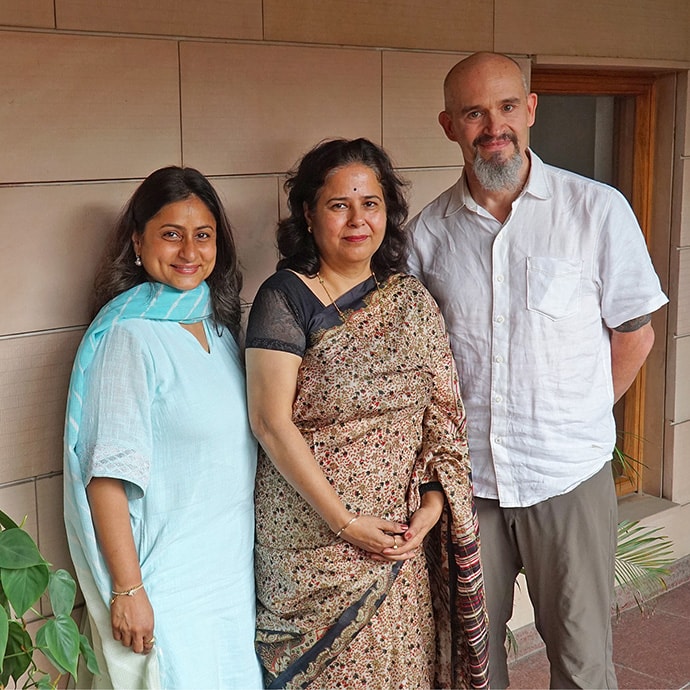
Anjali Makhija (center), Trustee and CEO of S M Sehgal Foundation, Pooja Oberoi Murada (left), Principal Lead for Outreach for Development, and Joel Meyers, Director of Communications for GlobalWA.
She continued, emphasizing the goal of Sehgal Foundation to “empower communities and farmers who are confident citizens who make smart decisions” about farming techniques, farm mechanization and technology (ICT), and soil nutrition.
“We work to help people help themselves. We work with the people, not for.”
Sehgal Foundation’s Agriculture Development Program, a key and crucial component for ensuring food security and sustainability in India, has “interventions” to build capacities of farmers, including women farmers, and improve agricultural practices. Additionally, the agriculture program trains farmers and helps them implement new technologies that increase crop yields, conserve water, and improve soil fertility.
India is becoming a model for sustainable food production driven mainly by the National Food Security Act of 2013, which starts with the premise: “The basic concept of food security globally is to ensure that all people, at all times, should get access to the basic food for their active and healthy life and is characterized by availability, access, utilization, and stability of food.”
In fact, Anjali pointed out that India has become self-sufficient for food production, seeing a six-fold increase for food production from 1950–2020, and has become a net food exporter.
But, according to Anjali, the challenge is how to sustain this trajectory, especially with climate change. “Climate change is a real challenge—how do we keep up food production and enumeration, as well as keep the farmers interested?”
Their local farming and empowerment programs strive to address this, and, from what I was witnessing this day, they are succeeding.
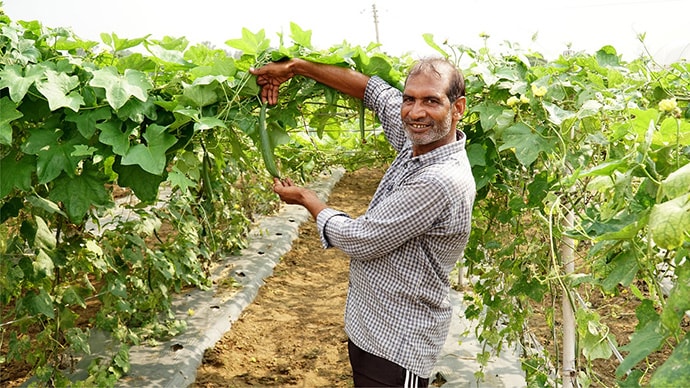
Through the agriculture interventions, Sehgal has helped farmers understand water conservation, efficient drip irrigation and micro-sprinkler techniques, proper soil nutrition with locally available fertilizers, thus increasing yields 40-50% which also allows increased economic savings. These model demonstrations spread naturally through word-of-mouth through the community of local smallholder farmers. Photo: Joel Meyers
Creating strong women leaders
Empowerment of women is a key aspect to all their programs. “We have programs to empower women to be leaders for water in farming and farming techniques, in governance, in schools, and in leadership positions,” Anjali said.
I was able to visit one of these communities of empowered women in Nuh later that day. Nine women from Nuh and neighboring villages gathered to meet with me and talk about their experience.
Shashank informed me that “these women are selected based upon their willingness to work with the [male] farmers and be active participants, then we provide them with leadership training. We start the training with confidence building and communication so they can communicate with other farmers, other villages. We then train them in agriculture techniques such as laser leveling, crop demonstrations, soil micronutrients, animal nutrition and benefits, based upon the season and needs. They then assimilate this information to fellow farmers and farmers in other villages.”
With this new confidence and knowledge, they are empowered leaders who can provide ongoing support, in essence becoming leaders in their communities.
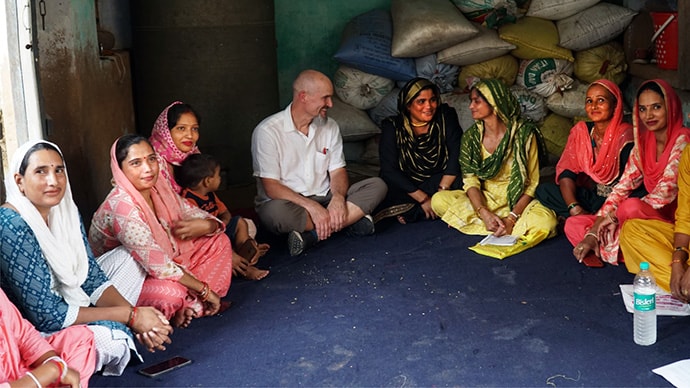
I was invited to sit with the local community women farmers. Photo: Shashank Devra
Expanding knowledge to smallholder farmers
At the farm in Nuh, Shashank introduced me to his team, and the farmer, who smiled in shy pride. Shashank led me along a pathway bordering a trellis of lush zucchini vines with row upon row of black PVC tubing along the plants’ stems, interconnected and culminating at a junction at one end of the field. He spoke to me, with translated comments from his colleagues and answers from the local farmer, of these rural smallholder farmers’ need for more efficient watering methods—exactly what Sehgal Foundation had introduced here.
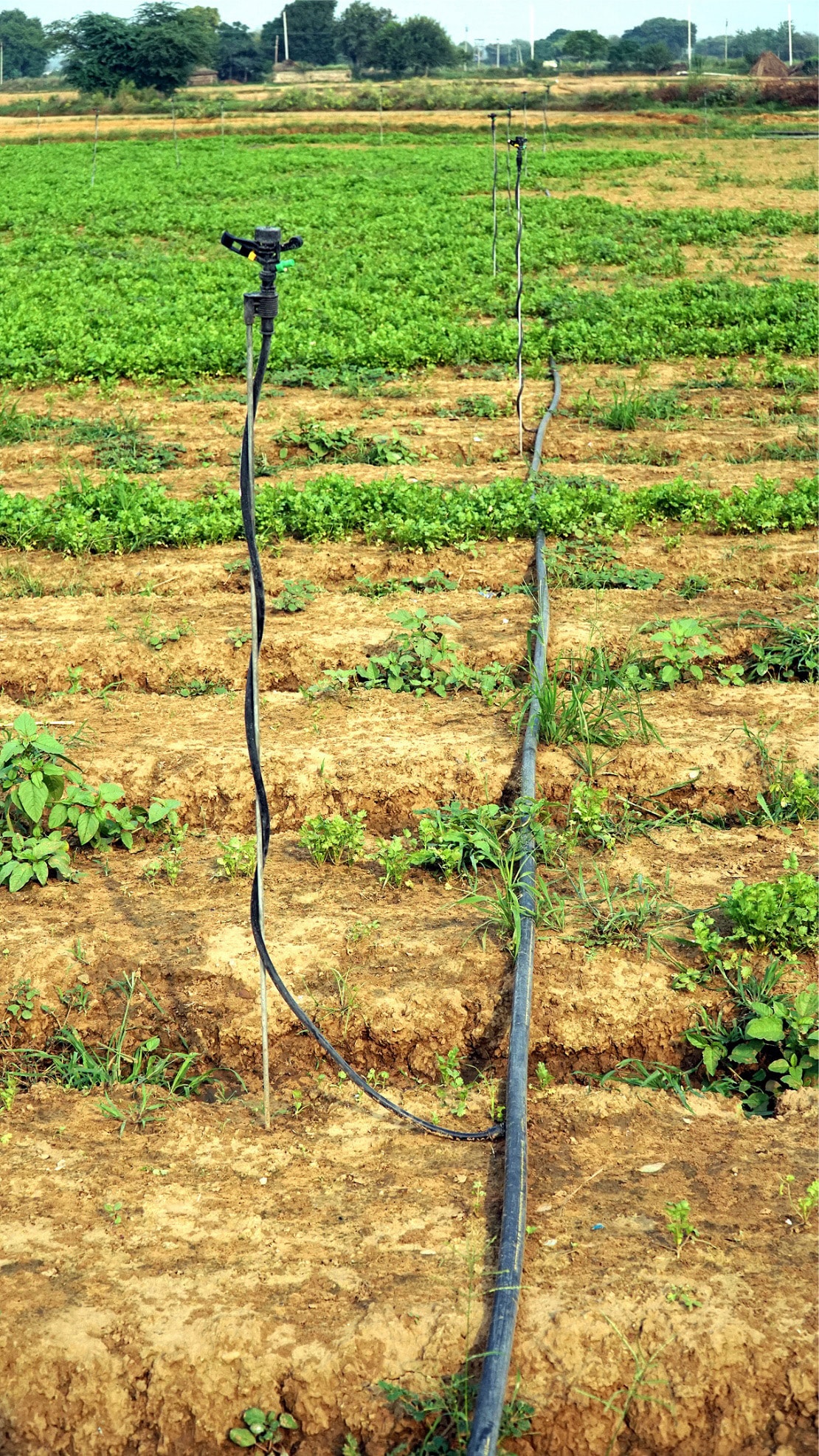
Micro sprinkler systems provide more efficient and consistent irrigation for the smallholder farm. Photo: Joel Meyers
With Sehgal Foundation’s help, and a small investment by the farmer, the farmer selected and purchased the piping and valves to provide concentrated, specific plant-stem watering to take the place of traditional flood irrigation. Flood irrigation is a method of watering, allowing the monsoon and/or piped water to flood the planted fields—a rough and imprecise method that often washes the away the seeds; and after the rain ends, the soil dries out too quickly. Using the drip irrigation of cistern-caught rainwater instead, this farmer had experienced a 40% greater yield and cost savings. (He used his new savings to purchase, plant, and water new fields in this new way.) At the field of zucchini, they showed me how having the vines elevated, and by putting down long rows of plastic sheeting the stems grow through, that the shade and plastic drastically inhibits water evaporation through the soil.
Along with this new low-cost and efficient watering technique, the Sehgal Foundation team teaches farmers how to locally source the materials as well as new macro- and micronutrients for their fields. This keeps the economies local; empowers farmers to take care of their land, using knowledge backed by science and data; creates greater yields; increases farmer family savings, and influences other farmers to learn based on these local successes.
A path guided by data and analysis
India and the world are fraught with changes in the climate and the ensuing challenges for farming and food production; these factors threatens food security that ensures their communities are fed with sustainable and nutritious crops. Sehgal Foundation is a model organization that is not only guided by governmental and UN principles, but also, and primarily, their foundational mandate of social impact. Their programs empower women, farmers, and local communities to be self-sustaining, and the work is backed by community dialogue, impact assessments, data gathering, and data analysis—all especially important as conditions continue to evolve with climate change. Rural India has a true partner with Sehgal Foundation.
************
S M Sehgal Foundation has been a GlobalWA member since 2022. Sehgal has been working since 1999 to improve the quality of life of the rural communities in India. As a rural development NGO, established as a public, charitable trust, Sehgal Foundation has a skilled and dedicated team that creates sustainable programs to address rural India’s most pressing needs: Sehgal Foundation has five main program areas: Water Management, Agriculture Development, Local Participation and Sustainability, Transform Lives one school at a time, and Outreach for Development. These programs are supported by a skilled research team that engages in participatory research, impact assessment, and interactive dialogues to determine informed actions to achieve sustainable results. Read more about Sehgal Foundation